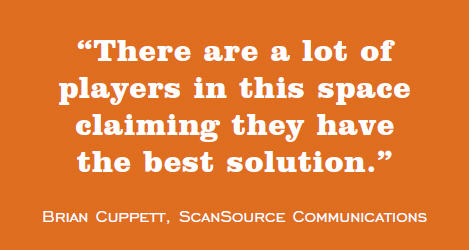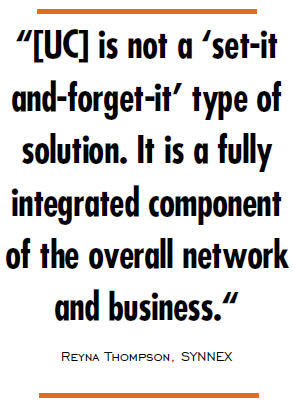Why Are You Putting Off Selling UC as a Service?
By Jay McCall, Business Solutions magazine
Often the one area an MSP shies away from, selling UC (unified communications), is one of the best ways you can create stickier customer relationships and find new areas of recurring revenue.

It’s funny how some of the same business challenges we’ve been covering in Business Solutions since 2005 are still relevant today. Take UC, for instance, and the topic of QoS (quality of service). Years ago, when I was on a call with an interviewee, if the call quality was poor, I’d always ask, “Are you on a VoIP [voice over Internet Protocol] phone?” And almost every time the answer was “Yes.” Nowadays, I have to admit it doesn’t happen as often, but it does happen often enough — surprisingly. What’s always made this situation especially surprising is the fact that the people I would often be asking these questions to were VoIP/UC VARs — business owners that you’d expect to have a handle on the challenges that come with selling UC.
It’s with that background knowledge that I ask you the question, “Why aren’t you offering UC as a Service as part of your managed services offering?” I’m sure it’s something you’ve probably considered, or maybe you’ve tried before. But, before you give up on it, consider what industry experts from value-added distributors ScanSource Communications and SYNNEX have to say about this matter.
Determine How Involved You Want To Be In UC Deployments
One of the objections that keeps some MSPs out of the UC business is the fear of being pulled too far away from their core skillsets. According to Reyna Thompson, vice president, ICG at SYNNEX, that shouldn’t stop you. “Even if an IT solutions provider doesn’t have all the technical skills to sell and fully manage a VoIP/UC solution, it can still engage clients as an agent and outsource the servicing to another provider. Another option is to get more involved as a partner and handle customer-facing support issues, but outsource the back end services to another services provider.” The benefits of taking one of these approaches is that you can still be seen by your customer as the total solutions provider, and by engaging with the providers handling some of the support, you’ll be in a better position — using service contracts — to keep them from creeping on your customers.

Which Solution Is The Best Fit For Your Customers?
Another reason some MSPs take a hands-off approach to selling UC solutions is the complexity involved with selecting the right kind of solution. “There are a lot of players [i.e. vendors] in this space claiming they have the best solution,” says Brian Cuppett, vice president of merchandising at ScanSource Communications. “MSPs should be doing a lot of due diligence on the front end to make sure they are evaluating and finding the best go-to-market service providers that will determine their success in this managed services business.” Thompson concurs with this and adds, “One of the biggest mistakes MSPs make when trying to break into the VoIP/ UC market is trying to do too much. For example, they have to determine the best platform, infrastructure, integration method, partner structure, hardware, and software, which involves a great deal of research, discussion, testing, evaluating, bundling, contract negotiation, process building, and marketing.” This is where VADs (value-added distributors) can be particularly valuable partners to MSPs. Unlike working directly with vendors, most VADs represent multiple vendor solutions, they’ve already done a thorough job vetting their vendor partners, and they’re less biased in helping you select the right bundled solution for your customers.
If You’re Going To Sell UC, Don’t Skimp On These Details
If you decide to get involved in selling UC solutions at more than an agent level, it’s important to keep in mind one thing. “Selling these solutions is different from selling traditional IT hardware and software,” says Cuppett. “Having experts on the team to deliver the right solution sale is more effective than just adding it on as one more offer in a salesperson’s bag of tricks.”

According to Thompson, there are two other details you don’t want to skimp on: developing clear messaging and creating real differentiation with your offering. “Standing out in a crowded, confusing segment can be challenging,” she says. “Elements like QoS, proper and accurate billing, solid uptime, and end-user education all become front stage when dealing with UC. This technology is not a ‘set-it and-forget-it’ type of solution. It is a fully integrated component of the overall network and business.” UC solutions need to be well-established and proven to be supportable to a scale that would bring value to both an MSP and its client base.
For those who can pull off selling UC as a service, the benefits are clear. In addition to keeping competitors away from your customers, a UC solution is very customer-facing. If done right, it shows you really do understand their business, and you really have earned the title “trusted adviser.”
